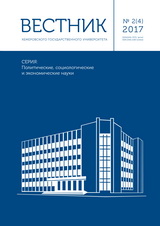Kemerovo, Russian Federation
The authors of the current paper have analyzed data obtained from opinion polls among Russian citizens (including those conducted among students and staff of various Russian universities). The surveys have revealed significant coincidences in the results obtained by different research centers regarding the reduction in the level of political and civic engagement of Russians in recent years. According to the surveys, this is largely due to the alienation of the significant part of the population from the government and the state. These people believe they are not able to influence the state decisions, which, in their turn, have little effect on the improvement of their everyday life. In the post-Soviet period, practically all the elective procedures were designed in such a way that they allowed the officialdom to be self-sufficient and independent from public opinion. As a result of formalized elections, the society in general, as well as separate communities, legitimizes this situation as democratic, since the governing structures are formed in the course of a multistage procedure involving a significant part of the population (employees). Thus, as sociological studies show, "the attitude of the population towards the authorities is greatly influenced by the discrepancy between the perception of the value of democracy and its implementation in real political practice. On the one hand, democracy values have rooted quite firmly in the society. On the other hand, the processes of democratization in public perception are of a nominal nature, i.e. they do not correspond with their purpose ". In a situation like this, management assumes a bureaucratic form, and the dominant type of political behavior in modern Russian society is paternalistic and subject-imposed. Individual liberties and democratic rights, although important, are not decisive and get diminished by other considerations, e.g. the interests of the community. It is obvious that everyone’s aim is adaptation and maintenance of the today’s status quo, because things might get worse tomorrow. It applies both to the behavior of the so-called political power and to the behavior of the so-called “unsinkable” officials on different levels, who belong to the top of the new nomenclature, as well as to the behavior of their subordinates. The situation described above indicates ritualization of political life, which is connected, on the one hand, with the divergence between the power elite and the masses, and, on the one hand, with the mutual interest of the authorities and the electorate in preserving the currently stabilized political and psychological situation in the country.
political activity, civic activity, democracy, conformism, paternalism, satisfaction index, social activity



















